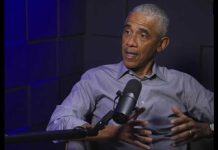
“I’m not for sale.” With that, Curtis Sliwa didn’t just reject a rumored $10 million bribe—he reignited the gritty, unpredictable spirit of New York City politics and dared anyone to try and buy his silence.
Story Snapshot
- GOP mayoral nominee Curtis Sliwa responded defiantly to alleged multimillion-dollar bribery attempts aimed at pushing him from the NYC mayoral race.
- Sliwa’s gesture and words signal unwavering intent to stay in the race, regardless of mounting pressure to exit following Eric Adams’ departure.
- Allegations swirled of a $10 million offer to Sliwa, underscoring the high stakes and backroom intrigue gripping the city’s political landscape.
- The episode highlights the enduring appeal—and risk—of outsider candidates who refuse to play by establishment rules.
Sliwa’s Defiance: Not for Sale, Not Backing Down
Curtis Sliwa, the Republican nominee for New York City mayor, met rumors of a $10 million bribe with a gesture as unmistakable as it was unfiltered: the classic New York chin flick, paired with a blunt “f–k outta here.” Reports quickly circulated that Sliwa faced mounting pressure to exit the race in the wake of Eric Adams’ withdrawal, but he cut through the speculation with streetwise candor. If powerbrokers or party insiders thought the city’s famed Guardian Angel could be bought, they underestimated his appetite for the political brawl—and the media spotlight it brings.
Political observers have long speculated about the costs—financial and otherwise—of staying in a New York City mayoral race that’s become a high-wire act. Sliwa’s refusal to step aside, despite whispers of a generous cash offer and growing calls for unity around a less polarizing figure, speaks to the city’s legacy of colorful, combative campaigns. He casts himself as a bulwark against backroom deals, and his response—public, profane, and unambiguous—was calculated to resonate with voters who resent political horse-trading as much as he does. In a moment when the city’s leadership vacuum draws national attention, Sliwa’s answer was pure Gotham: “I’m not for sale.”
Pressure Mounts After Adams’ Exit: A City Without a Favorite
The dynamic shifted dramatically after Eric Adams, the Democratic incumbent, bowed out of the race amid his own swirl of controversies. Suddenly, both parties scrambled to recalibrate. For Republicans, Sliwa became both a liability and an asset: his outsider persona draws headlines, but also threatens to fracture an already fragile coalition. Party elders, wary of chaos and hungry for a win, reportedly floated offers—financial and otherwise—to nudge Sliwa toward the exit. Sliwa, never shy of spectacle, chose instead to escalate the drama, making his rejection of the alleged bribe a public affair. This strategy not only fuels his campaign narrative but also exposes the raw calculations behind every political maneuver in New York’s toughest contest.
Curtis Sliwa accuses Cuomo campaign of trying to bribe him to quit NYC mayoral race https://t.co/JkLxOLXLuO pic.twitter.com/3kZeZRFVKD
— Eyewitness News (@ABC7NY) September 24, 2025
Bribery rumors, whether grounded or exaggerated, are nothing new in city politics. What stands out is Sliwa’s willingness to confront them head-on, turning what could have been a quiet negotiation into a headline-grabbing confrontation. For voters weary of cynicism and machinations, such transparency—however brash—may be its own form of integrity. Sliwa’s play is high-risk, high-reward: if he survives the storm, he’ll owe nothing to the party machine. If he fails, he cements his status as a martyr to the cause of political independence.
Outsider Appeal in an Insider’s Game
Few cities reward political iconoclasts like New York. Sliwa, who first gained fame patrolling subways in a red beret, has always styled himself as the anti-politician’s politician. This latest episode only deepens that brand. His refusal to exit, even when faced with financial temptation and institutional pressure, is a calculated embrace of the outsider’s role. It’s a gamble that speaks to a city’s hunger for authenticity—or at least the performance of it. In a climate where voters believe every candidate has a price, Sliwa’s message is both simple and subversive: some battles can’t be bought, and some fighters won’t be sold.
His campaign now pivots on that defiance. As the field narrows and the city’s power brokers search for a sure thing, Sliwa doubles down on the unpredictable. That unpredictability is his greatest liability—and his best weapon. The coming weeks will reveal whether New York still has room for a candidate whose only deal is with the voters themselves.
Sources:
Sliwa claims Cuomo-allied billionaires tried to bribe him to drop out of mayor’s race



